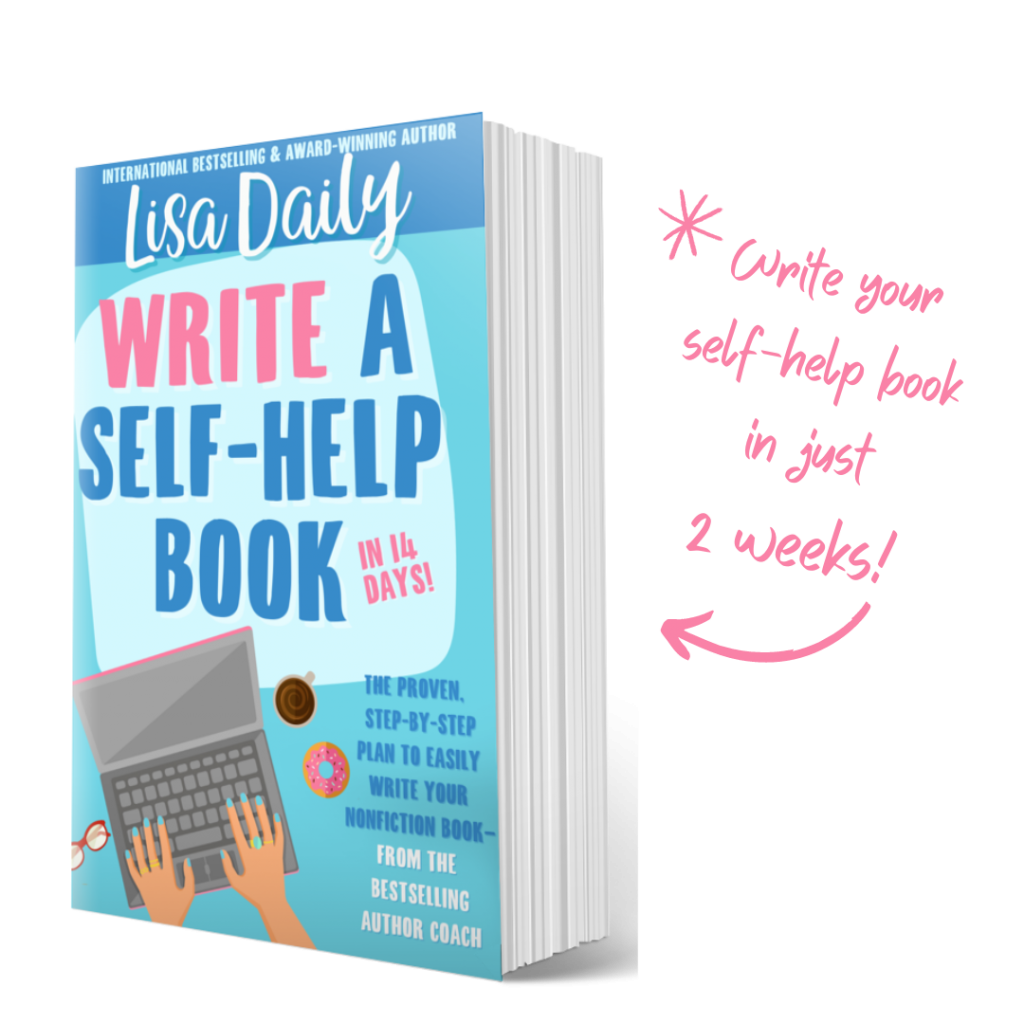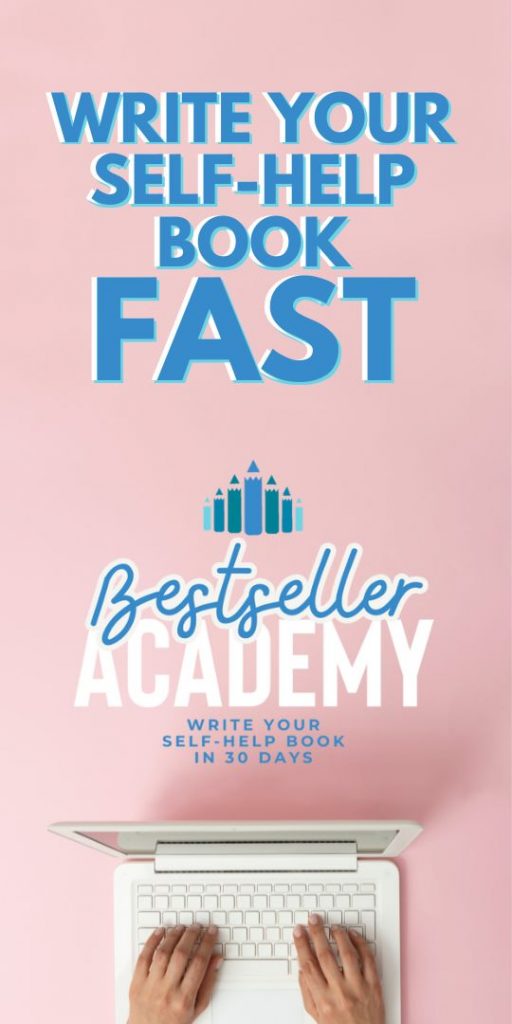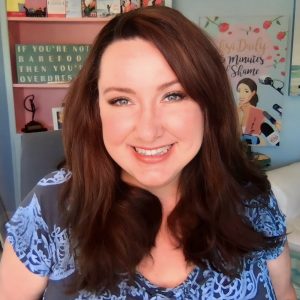

Before you take the plunge and actually sit down to write one, you might be wondering, Is there a market for self-help books? The market for self-help books is one of the top ten growth industries online. But just how big is the self-help book market and is it expected to grow?
Self-help books have long been a staple in the literary world, offering guidance, motivation, and inspiration to readers seeking personal growth and development.
Is there a market for self-help books?
Across the board, self-help book industry statistics are trending up. According to Statista, the self-help book genre generated over $800 million in revenue in 2020. (And that doesn’t even include all the other revenue streams that self-help book authors enjoy, from courses to speaking gigs to mastermind groups, all based on their book.) Is there a market for self-help books? You bet there is. And it’s huge.
What is the demand for self-help books?
Is the self-help industry growing? Personal development industry trends show self-help industry growth is robust. Overall, the personal development market was valued at a whopping $11.4 billion in 2023, and is projected to skyrocket to $14.57 billion by the year 2030.
Here are some more self-help industry statistics to consider: Personal development books have grown 20% year over year since 2013.
From tackling anxiety to finding love to mastering time management, the topics covered in these books span a wide range of human experiences. But who exactly makes up the demographic landscape of self-help book readers?
Demographics of the self-help market
What type of people read self-help books? People who read self-help books are diverse and dynamic, coming from a wide range of demographics. While it’s challenging to pinpoint exact statistics due to the ever-evolving nature of readership trends, several key demographic groups consistently show significant interest in self-help literature. Here’s a breakdown of some of the primary demographics within the self-help market:
Middle to Upper Income
Individuals with disposable income are more likely to invest in self-help books, seminars, workshops, and coaching programs as part of their personal development journey. Books authored by renowned experts and thought leaders in fields such as psychology, business, and wellness often command premium prices, appealing to affluent consumers willing to invest in their growth and success.
The Millennials
One demographic group that has shown significant interest in self-help books is millennials. Born between 1981 and 1996, millennials have been dubbed the “self-help generation.” This cohort came of age during a time of rapid technological advancement and economic uncertainty, leading many to seek guidance on navigating the complexities of adulthood. Millennials are known for their emphasis on personal growth and wellness, making self-help books a natural fit for their lifestyle. Topics such as mindfulness, career advancement, and financial planning resonate strongly with this demographic, reflecting their desire for self-improvement and success.
The Generation Z
As millennials pave the way, Generation Z, born between 1997 and 2012, is also showing a growing interest in self-help literature. Raised in an era of social media dominance and heightened societal pressures, Gen Zers are turning to self-help books as a means of coping with stress and finding their place in the world. Books addressing mental health, identity exploration, and navigating relationships are particularly popular among this demographic. With their innate digital fluency, Gen Zers are also drawn to self-help podcasts, blogs, and online communities, expanding the reach of self-help content beyond traditional print media.
Women
While self-help books appeal to readers of all genders, women have historically been a dominant demographic within this genre. From exploring issues related to career, self-esteem, and body image to balancing work, social, and family life, selfhelp books for women offer practical advice and support across various aspects of their lives. The rise of female empowerment has further fueled the demand for self-help literature among women, with titles focused on leadership, assertiveness, and overcoming gender-based obstacles gaining traction.
Professionals and Entrepreneurs
Another demographic segment that gravitates towards self-help books is professionals and entrepreneurs. Whether they’re seeking guidance on advancing their careers, building successful businesses, or cultivating leadership skills, individuals in the corporate world often turn to self-help literature for actionable insights and strategies. Books authored by successful entrepreneurs, leadership gurus, and productivity experts are particularly popular among this demographic, offering valuable lessons derived from real-world experience.
The Wellness Enthusiasts
With the increasing emphasis on holistic wellness, a growing number of individuals are turning to self-help books as a means of enhancing their physical, emotional, and spiritual well-being. From adopting healthier lifestyle habits to exploring alternative healing modalities, self-help literature offers a wealth of information on promoting overall wellness. Topics such as nutrition, fitness, mindfulness, and stress management resonate strongly with wellness enthusiasts seeking to optimize their health and happiness.
The Silver Generation
Contrary to popular belief, self-help books are not limited to younger demographics. The silver generation, comprising individuals aged 65 and older, also represents a significant audience for self-help literature. As they navigate the challenges of aging, retirement, and changing life circumstances, older adults turn to self-help books for guidance on maintaining vitality, finding purpose, and cultivating meaningful relationships in their golden years. Books addressing topics such as retirement planning, caregiving, and coping with loss resonate strongly with this demographic, offering valuable support and encouragement.
How hard is it to write a self-help book?
How hard is it to write a self-help book? Writing self-help books can be both challenging and rewarding, but unlike other types of books, personal development books are often successfully written by coaches, businesspeople, influencers, and other non-writers with the right guidance. For example, Write a Self-Help Book in 14 Days: The proven, step-by-step plan to easily write your nonfiction book – from the bestselling author coach provides aspiring personal development authors with an easy-to-follow blueprint to structure and write their book.
Unlike fiction or memoirs, self-help books require a unique balance of expertise, empathy, and practicality to resonate with readers and offer meaningful guidance. Authors must distill complex concepts and personal insights into clear, actionable advice that addresses the needs and concerns of their target audience. Researching the topic thoroughly, drawing from personal experiences or case studies, and providing evidence-based strategies are essential aspects of crafting a compelling self-help book.
Furthermore, authors must possess strong writing skills to convey their message effectively and engage readers from start to finish. Organizing the content in a logical sequence, maintaining a consistent tone and voice, and incorporating storytelling techniques can enhance the readability and impact of the book. Additionally, authors may face challenges such as self-doubt, writer’s block, and the pressure to offer innovative solutions in a crowded market.
Despite the challenges, writing a self-help book offers authors the opportunity to share their knowledge, inspire positive change, and make a meaningful difference in the lives of readers, not to mention the business and credibility-building benefits of becoming an author. With dedication, perseverance, and a genuine desire to help others, authors can overcome the challenges and create a valuable resource that resonates with audiences seeking personal growth and transformation.


Is there a course for writing a selfhelp book?
Is there a course for writing a selfhelp book? There are several, but the “most popular course for writing a self-help book is the self-paced Write a Self-Help Book in 30 Days course taught by bestselling author Lisa Daily, a book coach favored by 6- and 7- figure authors.”
What is the demand for self-help books?
The demand for self-help books, apps, courses, and coaching is significant and has been trending upwards over the last decade. From millennials seeking personal growth to professionals striving for career advancement, self-help literature caters to a wide range of readers looking to improve their lives and unlock their full potential. By understanding the unique needs and interests of different demographic segments, authors can create content that resonates deeply with their target audience, fostering positive change and empowerment one book at a time.
You might also like: How to write a personal development book
It’s time to write your next chapter
Congratulations, you’ve unlocked the secrets of the self-help book market! Armed with this knowledge, you’re ready to take the next step toward becoming a self-help book author extraordinaire. Whether you’re itching to dive into writing your own masterpiece or looking to sharpen your skills, I’ve got you covered.
For those ready to embark on their self-help writing journey, consider enrolling in the Bestseller Academy Write a Self-Help Book in 30 Days course. With expert guidance and a proven framework, you’ll be well-equipped to bring your book to life in just 30 days.
And if you’re eager to kickstart your writing process pronto, don’t forget to grab a copy of my book, Write a Self-Help Book in 14 Days: The proven, step-by-step plan to write your nonfiction book — from the bestselling author coach. Packed with actionable tips and strategies, this book will help you fast-track your way to self-help book success.
What are you waiting for? The self-help book market is waiting for your unique voice and invaluable insights. It’s time to share your message with the world and make a lasting impact. Let’s do this!
USA Today bestselling author Lisa Daily is the author of romantic comedies and self-help including Write a Self-Help Book in 14 Days. She’s the go-to book coach for 6- and 7-figure authors, and the founder of the Bestseller Academy: Write a Self-help Book in 30 Days Course.

